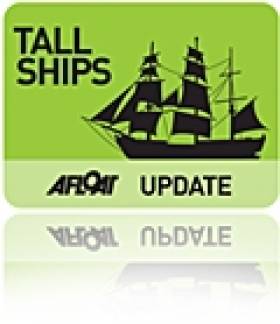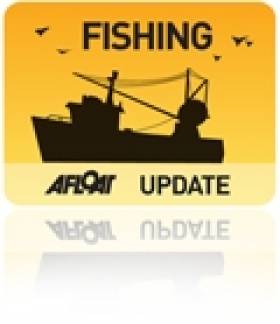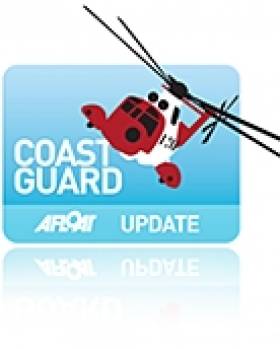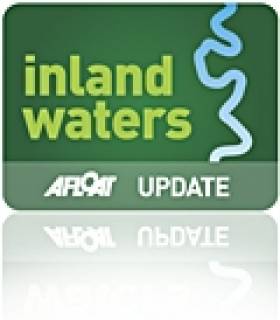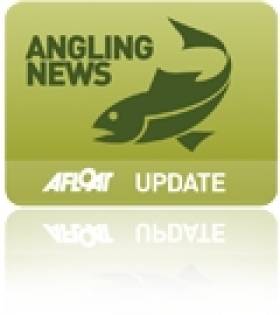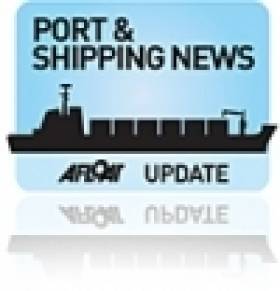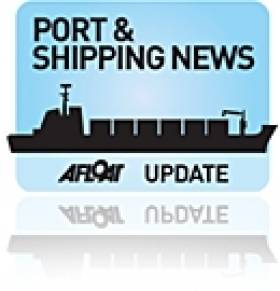Displaying items by tag: Drogheda
Full Steam Ahead As Maritime Festival Gets Sponsorship
#TallshipsDrogheda - The Irish Maritime Festival in Drogheda which has drawn thousands of visitors to Boyneside received a major boost with the official announcement that Maxol, has come on board as the festival's main sponsor.
Last year over 37,500 people of all ages visited the festival which offered many attractions along Drogheda Port, including vintage vessels, the Drogheda Motor Show, artisan food market, maritime history, live entertainment, pirate battles and the Boyne Swim.
Expectations are high that this year's festival, which takes place in Drogheda from Friday-Sunday, June 19-21, will surpass that attendance figure with full programme details to be announced later this month.
Involved since its establishment, Louth County Council, is now a main funder and programme manager of the Festival which is hosted in conjunction with Drogheda Port. Both the Council and Port warmly welcomed Maxol's major commitment to The Irish Maritime Festival.
Denis Moynihan, Chairman of the port, said "On behalf of Drogheda Port Company, I welcome the Maxol Group to the growing Irish Maritime Festival family. In playing a vital role in this annual festival, Drogheda Port welcomes the renewed focus on the town's unique maritime culture and heritage.
He added, "the Festival is a considerable co-operative undertaking each year and we look forward to what will be the biggest and best festival yet."
Drogheda Hosts North Atlantic Salmon Conference
#Fishing - Drogheda is hosting the 30th annual meeting of the North Atlantic Salmon Conservation Organisation (NASCO) this week till Friday 7 June.
The prestigious fisheries conference will take place in the Westcourt Hotel and will be attended by delegates from Canada, Denmark (in respect of the Faroe Islands and Greenland), the European Union (representing its 27 member states), Norway, Russia and the USA.
Welcoming the conference to Drogheda on Tuesday 4 June, Minister Fergus O’Dowd said it "will continue the key work of NASCO, using the best scientific information, and international co-operation to conserve and manage Atlantic salmon populations.
"I wish the many delegates a friendly and intellectually stimulating stay in Drogheda where the meeting programme will no doubt provide insights and an outstanding platform for dynamic networking to ensure the continued conservation of our precious salmon stocks."
Based in Edinburgh, NASCO is an international organisation established by an intergovernmental convention in 1984. Its main function is to conserve, restore, enhance and rationally manage Atlantic salmon through international cooperation taking account of the best available scientific information.
NASCO is the only intergovernmental organisation with this mandate, which it implements through international consultation, negotiation and co-operation.
Ireland is at the forefront of salmon conservation internationally, according to Inland Fisheries Ireland, which adds that Irish participants at the conference include a Government delegation of managers and scientists and representatives of a number of Irish-based NGOs, including Salmon Watch Ireland.
The cross-border Loughs Agency, which has responsibility for salmon conservation and protection Foyle and Carlingford Loughs, will also be represented as part of the Irish delegation.
Drogheda Celebrates Succesful Tall Ships Festival
#tallships – Drogheda hosted its very first Maritime Festival at the weekend. The Tall ships arrived on the 3rd of May and sailed on the 6th of May with over 30,000 people having visited the port and ships over the period and the event was hailed as a tremendous success.
The ships were welcomed by His Excellency Turkish Ambassador Mr Necip Egüz as well as the Mayor of Drogheda Mr Paul Bell.
In the welcoming ceremony each of the visiting captains was presented with a copy of 'Portraits', which is a historical collection of films about 19 European seaports including Drogheda Port by the CEO of Drogheda Port Mr Paul Fleming.
Each of the Captains in return presented the Mayor of the town with a symbolic cargo, representing the main trades in Drogheda Port during the Sail Era. Captain Rob Salvidge of the Irene of Bridgewater presented a ball of Yarn, which was manufactured and exported for many years from Drogheda. Cpt Chris Rose of the Prolific presented Barley, an export which was grown in the fields locally. Captain Chris Wren of the Soteria presented Flour another popular export. Captain Topsy Toner of the Ruth presented some fine Bordeaux wine and lastly Captain Rodger Barton of the Johanna Lucretia presented a typical french import from this Era, Soap.
The Prolific had on board 16 local trainees from schools in Drogheda which had receive bursaries organised by the Port and Sail Training Ireland in conjunction with a number of local companies. The trainees had participated in a 6 day voyage from Liverpool to Drogheda.
Howth Coast Guard Assists Powerless Boat In Drogheda
#Coastguard - The Howth unit of the the Irish Coast Guard responded this weekend to a vessel that lost power at the mouth of the River Boyne.
Howth's coastguard crew were undertaking helm training with a passage to the Drogheda unit to support the Drogheda Marina launch when they were notified that a ski-boat planning to join the flotilla had lost power on the Drogheda Bar.
The vessel, with four people aboard, was taken under tow - while a mother and child on a second vessel suffering from serious sea-sickness were also transferred to the coastguard boat.
As previously reported on Afloat.ie, the Drogheda Port Company undertook dredging works in January this year on the entrance to the port on the River Boyle, following earlier works in 2010 to remove sand accumulating at Drogheda Bar.
#drogheda – The river Boyne at Drogheda welcomes 25 powerboats in the first of the town's Maritime Gathering events on Saturday, April 13th.
As reported by Afloat.ie in February, the Inland Waterways Association of Ireland, Powerboat Branch will be making their inaugural visit to Drogheda Port and Town.
The boats will gather at the mouth of the river at Mornington around noon and from there they will cruise into town in convoy in the company of the ports Pilot boat, the Lifeboat & the Coastguard, coming under the Viaduct at about 1230pm.
The beach at Mornington or Baltray will provide a perfect viewing point.
The boats will eventually land ashore at the Mall steps to be greeted by the Mayor, Paul Bell at 1pm. The Samba Band will be full swing on the Scotch Hall side to greet
the boats and the public are very welcome to come along to provide a warm and memorable reception for the visitors.
Powerboat Flotilla to Visit Drogheda & River Boyne
#drogheda – Up to 20 boats will visit the town on Saturday the 13th of April and along with the Drogheda Port pilot boats, the Clogherhead RNLI Lifeboat and the River Rescue Boats the flotilla will arrive and berth at the Mall close to the De Lacey Bridge in Drogheda Town centre for high tide at 12.45 p.m.
The Inland Waterways Association (IWAI) will make its inaugural visit to Drogheda Port and Town with a large number of rigid inflatable boats coming from as far away as Sligo, Lough Derg, Lough Ree, Lough Eme, Wexford, Dublin and a humber of local boats will also be taking part in the event.
Carmel Meegan, Vice President of Inland Waterways Association of Ireland said "This is a milestone occasion for IWAI and a first for Drogheda Port and Town to have so many visiting leisure boats on a single occasion.
The Powerboat Branch have travelled extensively on the inland waterways and in the past two years have extended their trips to coastal areas around Ireland. Drogheda has been selected as our chosen coastal venue for 2013.
Drogheda the largest town in Ireland, geographically it is ideally located in the North East for visiting pleasure craft. It is within range for visiting craft from the UK, Isle of Mann, Northern Ireland, Carlingford and Dublin based boats.
There is potential to promote the Boyne Valley Area from this angle and we would be delighted to see the people of Drogheda come out and lend their support this event."
Mr Denis Moynihan, Chairman of Drogheda Port Company and the Mayor Mr Paul Bell will welcome the association to the Port and a reception will be jointly hosted with the Drogheda Borough Council in the D hotel.
There is an interesting itinerary of events planned which will include visiting the centre of Drogheda and travelling to the Sea lock at Oldbridge to see progress on the IWAI Boyne Navigation Branch Project and a tour of the Battle of the Boyne Site.
Mr Denis Mr Denis Moynihan, Chairman of Drogheda Port Company said "This is a fantastic boost to tourism in the local area and our hope is that this will grow and become a regular event with the IWAI and that visiting boats from the UK and further afield can be attracted. It is quite important that the appropriate infrastructure is developed to encourage this type of maritime tourism"
Mr Paul Bell, Mayor of Drogheda attending the launch of the IAWA inaugural visit to Drogheda said "It is very encouraging to see the growing tourism potential through the River Boyne and its ability to attract tourists to the town and surroundingarca. The Boyne Valley region is naturally steeped in history and quite rightly, there is a growing recognition of its ability to generate economic growth. As Mayor of Drogheda,I am extremely committed to working alongside the Port and other groups in this very exciting maritime year for the locality."
The Powerboat Branch of the IWAI continues to develop a programme to explore waters outside of the normal cruising grounds. This gives opportunities to day-boaters and power-boaters to discover new areas of water that they would not normally visit. This brought a whole new outlook to the association OWAD.
Man Escapes Jail for Illegal Fishing, Obstructing Officer
#ANGLING - A man narrowly escaped prison for obstructing a fisheries officer in a case taken by Inland Fisheries Ireland (IFI) at Carrickmacross District Court earlier this month.
Piotr Flaga - of Bog Road in Drogheda - was fined €450 by Judge Sean McBride after he was found to have set lines at a lake in Carrickmacross on 18 and 19 August last with the intention of taking coarse fish illegally.
The court heard that when apprehended by Assistant Inspector Ronan O’Brien, Flaga refused to co-operate and would not give his name and address. He then obstructed Asst Insp O’Brien by moving his vehicle towards him in a bid to escape when questioned.
Gardai were called to the scene and subsequently Flaga was issued with two summons.
Flaga entered a guilty plea and was convicted under Sections 301 and 308 of the 1959 Fisheries Act. He was further charged for breach of byelaw 595 of 1977 in relation to fishing in fresh water for coarse fish by means other than rod and line.
The defendant was fined a total of €450 with five months to pay with 14 days imprisonment in default. Some €500 in costs were also awarded to Inland Fisheries Ireland.
Judge MacBride acknowledged Flaga's public apology to Asst Insp O'Brien, but emphasised that any person who came before him in future for a similar offence would face imprisonment.
Shackleton: A Century Apart
Writers, musicians and actors will be joined by relatives of Shackleton for an evening of theatre, illustrated talks, newspaper readings, poetry and song in the splendid interior surroundings of the city-centre venue (click here).
Tickets for the evening event on Monday 21 February, starting at 6.30pm, cost €10 at the door or can be purchased in advance by contacting (01) 872 2377. The event will be repeated in the Droichead Arts Centre, Drogheda on Monday 28 February, at 8pm. For further details Tel: (041) 983 3946
Irish cargo-ship remains aground off Drogheda Port
The Drogheda Port Company's patrol launch, Boyne Protector has been monitoring the situation as the Arklow Raider lies close to the entrance of the Co. Louth port.
Government Begins Review of Irish Ports
Minister for Transport Noel Dempsey T.D. today announced the launch of a national ports policy review with the publication of a consultation document.
There are ten State commercial port companies established and operating pursuant to the terms of the Harbours Acts 1996 - 2009; Cork, Drogheda, Dublin, Dundalk, Dún Laoghaire, Galway, New Ross, Shannon Foynes, Waterford and Wicklow.
It is estimated that approximately 99% by volume of all goods traded into and out of Ireland are handled at our ports. Dublin Port is the State's biggest port handling approximately 44% of all tonnage in 2009. Cork and Shannon Foynes were the second and third biggest ports respectively in 2009.
Today's consultation document provides stakeholders with an opportunity to help shape future ports policy.
Speaking today Minister Dempsey said; "In 2005 our national Ports Policy Statement outlined national ports policy in a single document for the first time. Since then the commercial, technological, and regulatory environment in which Irish ports operate has changed dramatically, both domestically and globally. It is now time to carry out a review of this policy framework to ensure that our ports are properly positioned for the future.
Since 2005 our ports have experienced both record highs and more recently sharp declines in tonnage throughput. The ports face considerable challenges and it is important that national policy helps address these. The indications are that the country's return to economic growth will be export led. In this regard, it is vital that the ports are in a position to facilitate this and to make their contribution to improving national competitiveness.
I would encourage all interested parties to engage fully in this important consultation process."
The consultation document provides an overview of developments in the sector since 2005 and poses a number of questions on the continued validity and future direction of national ports policy.
Important issues addressed in the document include planning and funding future port developments, the role ports have to play in delivering the "Smarter Travel" agenda, competition within the sector and the corporate governance regime for port companies.
The public consultation period is scheduled to continue until Friday 29th October 2010.
The full Consultation Document is available for download below
To make a submission click HERE
Read Tom MacSweeney's Island Nation blog on the importance of ports HERE


























